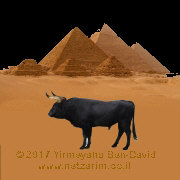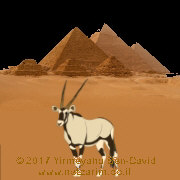
 |

Since Yi•sᵊr•â•eilꞋ was restoring the double-portion of inheritance to Yo•seiphꞋ, Yi•sᵊr•â•eilꞋ blessed each of Yo•seiphꞋ's 2 children, Ë•phᵊr•aꞋyim & Mᵊnash•ëhꞋ, directly; as though they were his own sons.
 |
| Flag of Ë•phᵊr•aꞋyim |
 |
| Flag of Mᵊnash•ëhꞋ |
Contrary to ancient Middle East convention, as Yi•sᵊr•â•eilꞋ blessed Ë•phᵊr•aꞋyim and Mᵊnash•ëhꞋ, he put his right hand on the head of the younger brother, Ë•phᵊr•aꞋyim, to give him priority in inheritance.
When Yo•seiphꞋ noticed that Yi•sᵊr•â•eilꞋ had his right hand on Ë•phᵊr•aꞋyim's head, he attempted to correct his father. But Yi•sᵊr•â•eilꞋ assured him that he was aware of which of his hands were on which head and that Ë•phᵊr•aꞋyim would be the greater of the two. Then Yi•sᵊr•â•eilꞋ instructed that Am Yi•sᵊr•â•eilꞋ should thereafter bless their sons as follows:
"YᵊsimᵊkhâꞋ ël•oh•imꞋ kᵊË•phᵊr•aꞋyim wᵊkhiMᵊnash•ëhꞋ"![]() — giving priority to Ë•phᵊr•aꞋyim.
— giving priority to Ë•phᵊr•aꞋyim.
 Har Grizim (lft) 250x188.jpg) |
Additionally, Yi•sᵊr•â•eilꞋ apportioned to Yo•seiphꞋ one ùÑÀëÆí![]() above his brothers of the lands that Yi•sᵊr•â•eilꞋ had taken from the Ë•mor•imꞋ by force of sword and bow.
above his brothers of the lands that Yi•sᵊr•â•eilꞋ had taken from the Ë•mor•imꞋ by force of sword and bow.

Optional parental preparation:
In your family, does the father bless his sons and daughters nightly, or on Sha•bâtꞋ, accordingly?
Translation: "May Ël•oh•imꞋ place youmasc. sing. like [He has] Ë•phᵊr•aꞋyim and like [He has] Mᵊnash•ëhꞋ."
From this, the feminine is derived to bless daughters: éÀùÒÄîÅê àÁìÉäÄéí ëÌÀùÒÈøÈä, øÄáÀ÷Èä, øÈçÅì åÀìÅàÈä – Translation: "May Ël•oh•imꞋ place youfem. sing. like SârꞋâh, RiꞋvᵊq•âh, Râ•kheilꞋ and LeiꞋâh." ![]()
 sekhem (r) 0350x297.jpg) |
Questions you might anticipate that your child might raise and be prepared to discuss:
What does bequeathal mean?
What is a (cultural, scientific, etc.) convention?
![]()
 |
 |